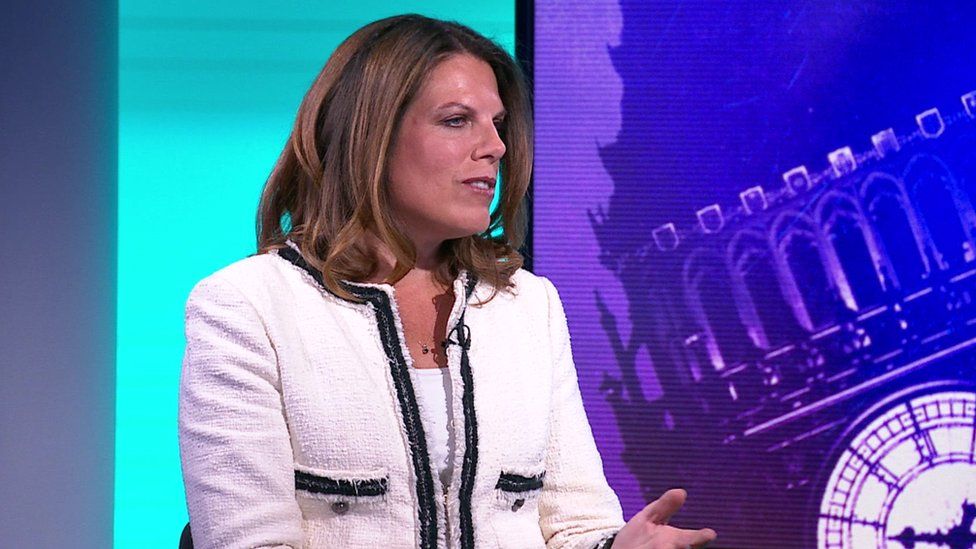
A senior Tory MP says she has experienced inappropriate behaviour about 50 times during her 13 years in the House of Commons.
Caroline Nokes, who chairs the women and equalities committee, told the BBC what some women working at Westminster had been through was “horrific”.
Whips, in charge of party discipline, needed to draw up a tougher and clearer code of conduct for MPs, she said.
And she called for Rishi Sunak to send a signal he backed stricter measures.
Ms Nokes, MP for Romsey and Southampton North, told the BBC’s Newsnight that behaviour had improved since she entered the Commons in 2010, and people who worked in Parliament felt they could speak out more freely.
She also said the “vast majority of MPs work really hard, try to do the right thing and are absolutely free from this sort of suspicion”.
But pressed on how many “inappropriate or weird or creepy” incidents she had been subjected to in Parliament, Ms Nokes replied: “Definitely more than 20, probably in the region of 50.”
She added: “I can think of an incident where a member of the House of Lords, in a restaurant, said hello to me, walked past, turned around, came back and stroked my bare arm in the presence of a journalist.
“I can think of other incidents where a Labour MP patted me on the backside and told me that I’ve done well to lose weight. Now he, in that instance, looked about as shocked as I did, and clearly instantly regretted what he’d done.
“But other incidents, where colleagues have put their hands on my thigh and told me at great length, how their wives don’t understand them. It’s just horrific.”
She said there were people she would not get in a lift with and female MPs would “provide information to each other on who to trust, who not to trust, who we think is a little bit creepy”.
Despite the increasing number of women in the Commons, there was still a “really laddish culture where the ‘banter’ defence is used – ‘oh well, she just can’t take a bit of banter'”.
“It’s just not acceptable in the 21st century workplace,” she said.
She called for a new code of conduct to be “absolutely explicit” in spelling out that touching colleagues or watching pornography in Parliament was unacceptable, urging whips in all parties to work together on new rules.

“There can’t be any grey areas, and it has to apply equally to members of the House of Lords,” she said.
On Thursday, the Commons standards committee found that former Tory MP Chris Pincher, who now sits as an independent, should be suspended from the Commons for eight weeks for drunkenly groping two men.
Mr Pincher’s conduct at the private members’ Carlton Club in London was “profoundly damaging” and “especially grave” because it amounted to an abuse of power and was an “egregious case of sexual misconduct”, the committee said.
‘Role for Sunak’
Downing Street said it was a matter for Mr Pincher whether he should resign as MP for Tamworth, which would trigger a by-election. A by-election could also result if MPs approve the committee’s report.
The prime minister has been absent for Commons votes on other disciplinary matters, including the Privileges Committee report that found that Boris Johnson had deliberately misled Parliament.
Ms Nokes said he should show support for the standards committee’s findings in the Pincher case.
She hoped a vote would not be needed, with MPs endorsing the report without dissent, but Mr Sunak had “a role to play in accepting the recommendations”.
Pushed on whether Mr Sunak should be in the Commons when Mr Pincher’s case was considered, she said: “I think the prime minister could do that for us.
“I think that would be a really strong signal that he’s not going to tolerate it, and that would send a message to the chief [whip]: get this sorted.”
Earlier this week, five current and one former parliamentary staff members told Newsnight that inappropriate flirting and touching was common, with older MPs and staffers sometimes targeting younger women.
On Tuesday, Mhairi Black, the SNP’s deputy leader at Westminster, announced she was stepping down as an MP at the next general election, describing Westminster as an “outdated, sexist and toxic” working environment.
She blamed safety concerns, social media abuse and unsociable hours.




